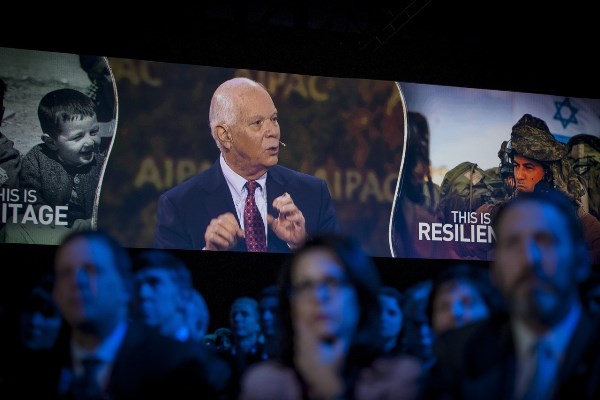 Senator Ben Cardin participates in a discussion at the annual American Israel Public Affairs Committee conference in Washington, D.C. on Sunday. PHOTO: PETE MAROVICH/EUROPEAN PRESSPHOTO AGENCY[/caption]
Senator Ben Cardin participates in a discussion at the annual American Israel Public Affairs Committee conference in Washington, D.C. on Sunday. PHOTO: PETE MAROVICH/EUROPEAN PRESSPHOTO AGENCY[/caption]President Obama Sending Two Top Foreign Policy Aides to Address the Conference on Monday.
WASHINGTON�The leadership of the most powerful pro-Israel lobby in the U.S. publicly broke Sunday from the White House over the issue of Iran policy during the first of a three-day policy conference in Washington attended by 16,000 of its members.
Leaders of the American Israel Public Affairs Committee, or Aipac, outlined a strategy moving forward of working through Congress to disrupt any nuclear agreement with Tehran that is deemed too weak in denying the country a nuclear weapons capability.
This would be achieved, they said, both by seeking to impose new sanctions on Iran and to block the White House�s ability to lift standing U.S. sanctions, which would be required as part of any comprehensive agreement.
�Congress has a critical role� in determining this deal, Howard Kohr, Aipac�s executive director, said in opening remarks aimed at rallying the group�s membership. �Congress�s role doesn�t end when there is a deal. Congress must review this deal.�
Mr. Kohr and other Aipac leaders believe any final agreement with Iran must involve the complete dismantling of Iran�s nuclear infrastructure, something�Obama�administration officials have said is no longer on the negotiating table.
Aipac also is seeking to impose new sanctions on Iran if there is no agreement by a late March deadline and to legislate an up-or-down vote in Congress. The White House is opposing both legislative actions.
Aipac�s efforts to shape the Iran deal through the Congress is being driven by what the organization believes has been President Barack Obama�s wariness of using both financial pressure and the threat of military force to challenge Tehran.
Secretary of State John Kerry sought to push back against Israeli criticism of the administration�s Iran diplomacy. In remarks Sunday on ABC�s �This Week,� Mr. Kerry said �the main goal here is to prevent Iran from getting a nuclear weapon. And on that, Israel and the United States agree.�
Aipac was central in lobbying for sanctions imposed on Tehran�s central bank in 2012 that were initially opposed by the White House.
Mr. Obama�s aides, including then-Treasury Secretary�Timothy Geithner�, had cautioned that passage of this legislation could lead to spike in global oil prices and undermine the U.S.�s economic recovery. Despite the White House�s opposition, 99 senators voted in favor.
In recent months, Obama administration officials have cited the same central bank sanctions as crucial to bringing Iran�s leadership to the negotiating table. Mr. Kohr and other Aipac leaders on Sunday said the penalties never would have been introduced without the organization�s lobbying of Congress.
�Congress, time and time again, has led the effort to bring pressure on Iran,� said Mr. Kohr. �The administration took ownership of this.�
Mr. Obama is sending two of his top foreign policy aides to address the Aipac conference on Monday in an effort to soften the organization�s position. They are national security adviser Susan Rice and Ambassador to the United Nations Samantha Power.
Senior U.S. officials have said in recent days that the hard-line position pursued by Israeli Prime Minister Benjamin Netanyahu and organizations like Aipac are unrealistic and could lead to a military conflict with Iran.
These officials are expected to argue that any agreement forged with Iran will significantly cap Iran�s ability to produce nuclear fuel and result in extensive monitoring of Tehran�s nuclear infrastructure. They also are expected to say that the U.S.�s unwillingness to accept a compromise deal with Tehran would lead to a splintering of the international coalition imposing the sanctions on Iran.
Aipac�s leadership on Sunday was already challenging the White House�s position. �We shouldn�t be afraid of Iran leaving the table,� Mr. Kohr said.
He also aggressively pushed back against the White House�s argument in recent months that no deal with Iran would lead to war. �That�s a false choice�that�s meant to silence the critics,� Mr. Kohr said. �And we won�t be silenced.�
Aipac�s strategy very much depends on its past success in winning bipartisan support for its policy suggestions, such as the sanctions on Iran�s central bank.
A number of leading Democrats have announced they�re going to boycott Mr. Netanyahu�s planned speech on Iran before a joint-session of Congress on Tuesday. Aipac leaders on Sunday urged these lawmakers to reverse this decision.
It remains unclear how many Democrats will support a White House deal with Iran heading into any election year, particularly one being so aggressively challenged by one of Washington�s most powerful political bodies.
Several top Democrats are scheduled to speak before Aipac on Monday, including the second-ranking Democrat in the House of Representatives, Rep. Steny Hoyer of Maryland, and a rising political star, Rep. Tulsi Gabbard of Hawaii.
On Sunday, Sen. Ben Cardin (D., Md.), addressed Aipac and pursued a policy line that seemed in sync with that of the pro-Israel lobby.
�You have to have deadlines,� Mr. Cardin said of the Iran talks. �It�s only because of U.S. pressure that we�ve gotten as far as we are.�
By The Wall Street Journal











